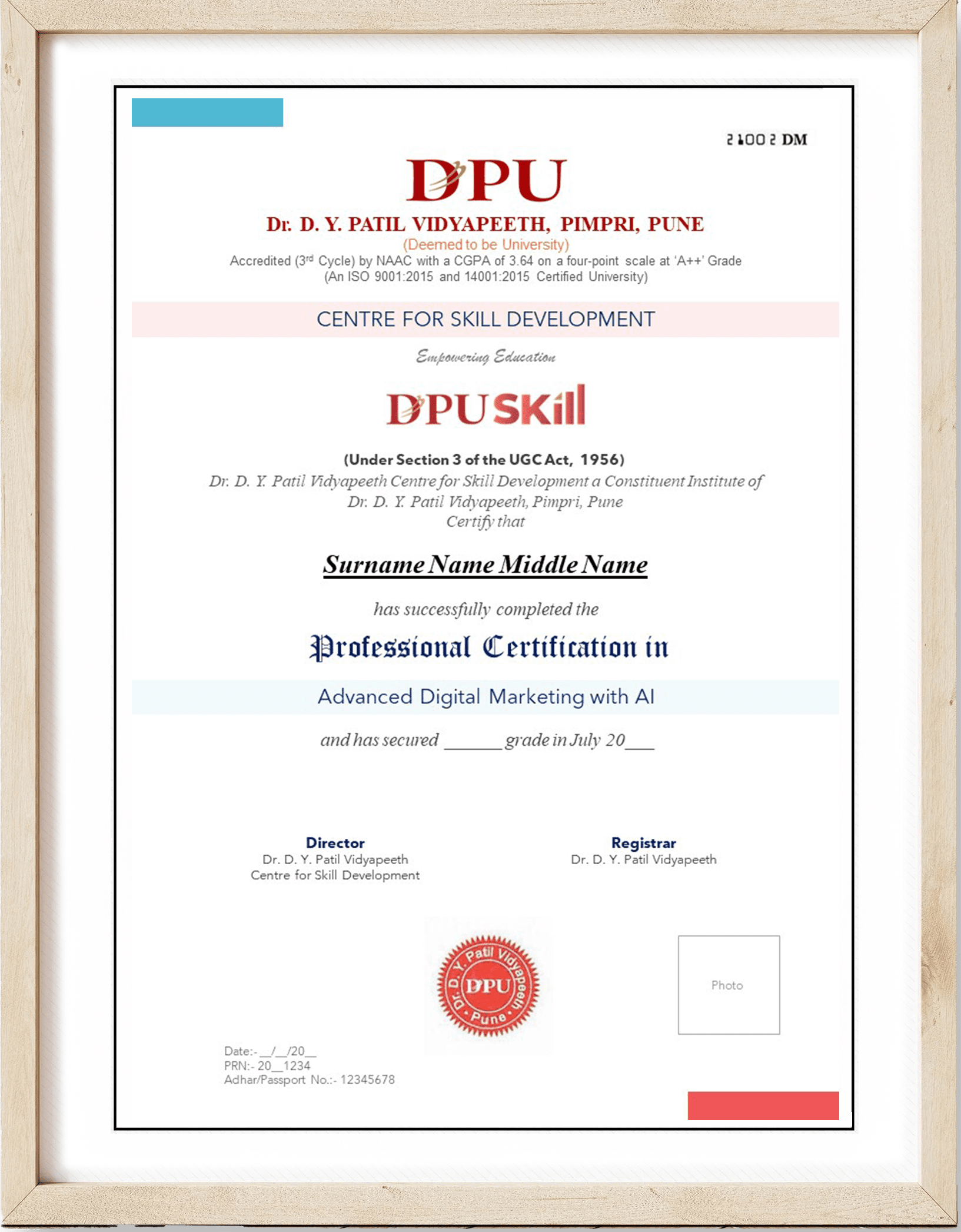
Advanced digital marketing with AI employs cutting-edge technologies like deep learning, natural language processing, and real-time data analysis to transform marketing strategies. It leverages AI for predictive analytics to forecast trends and optimize campaigns, while automated content creation and advanced personalization ensure highly tailored and engaging content for users. AI also enhances customer interactions through sophisticated chatbots and improves segmentation accuracy for more targeted marketing. By integrating visual recognition and voice search optimization, AI-driven digital marketing delivers precise, effective strategies that boost performance and drive better results.
 Introduction to Digital Marketing
Introduction to Digital Marketing
 Introduction to digital Marketing Channels and Format
Introduction to digital Marketing Channels and Format
 Search Engine Optimization (SEO)
Search Engine Optimization (SEO)
 Social Media Marketing
Social Media Marketing
 Introduction to digital marketing tools
Introduction to digital marketing tools
Advanced Digital Marketing with AI course typically targets professionals looking to deepen their expertise in digital marketing, particularly with a focus on leveraging AI technologies.
Graduate
By 2032, the AI and digital marketing market is expected to see substantial growth. AI applications in marketing, like chatbots and predictive analytics, are projected to grow at a CAGR of around 30% from 2023 to 2030. The global digital advertising market, including AI-driven tools, could reach about $1 trillion by 2032. Data analytics, which supports AI in marketing, is also growing rapidly, with a projected CAGR of around 24% from 2023 to 2030. This expansion highlights the increasing importance of AI in crafting personalized and effective marketing strategies.
Leverages AI technologies to optimize marketing campaigns, analyze consumer behavior, and enhance digital marketing strategies for better targeting and personalization.
Uses AI-driven tools and techniques to improve search engine rankings, optimize website content, and drive organic traffic to ensure higher visibility on search engines.
Manages pay-per-click advertising campaigns, analyzing data and using AI insights to optimize ad performance, maximize ROI, and increase conversion rates.
Analyzes social media metrics, tracks trends, and uses AI tools to gain insights into audience behavior, optimizing social media strategies and engagement.
Advises businesses on integrating AI into their marketing strategies, helping them harness AI-driven tools and technologies to improve decision- making and campaign effectiveness.
Ans : Advanced digital marketing with AI involves using artificial intelligence technologies to enhance and optimize digital marketing strategies. This includes leveraging AI tools for data analysis, campaign automation, customer targeting, content creation, and more.
Ans : Yes, small businesses can benefit from AI by using affordable AI tools and platforms to optimize their marketing efforts. AI can help small businesses improve targeting, automate processes, and gain valuable insights without needing extensive resources.
Ans : Popular AI tools include Google AI, IBM Watson, HubSpot, Marketo, Salesforce Einstein, and various AI-powered chatbots and analytics platforms. These tools help with automation, data analysis, content optimization, and customer interaction.

Instruction by digital marketing experts

Hands-on experience with AI tools

Flexible online learning format

Industry-recognized certification
Introduction, Significance, Core Concepts, Needs, Wants, Demand – Market It's Meaning and Classification, Marketing Management– Meaning and Functions, Market Segmentation and Targeting, Marketing Organization and Types.
What is Funnel, Marketing Funnel: Awareness, Interest, Consideration, Intent. Purchase, Top of the Funnel, Middle of Funnel, Bottom of the Funnel.
Definition, Importance, and Types of Digital Marketing, Common Objectives of Digital Marketing.
Digital Marketing Vs Traditional Marketing, Which kind of marketing is better, and how can organizations Use Both Digital & Traditional Marketing?
Impressions, Reach, Views, Clicks, Viewable Impressions, CTR, VTR, Traffic, Bounce Rate, Conversion, Buying models (CPC, CPM, CPI, CPA or CPL, CPD), Types of Advertisers - B2C, B2B, D2C, B2G, what is Performance Marketing? What are KPI’s?
Bringing Targeted Traffic-Inbound, Outbound, Converting Traffic into Leads.
Digital Marketing Be Used to Develop Brands and Drive Sales.
Key Mobile Marketing Concepts, Trends in Mobile, Opportunities & Risks, Mobile Devices, SMS Content, SMS Strategy, Mobile Advertising.
Overview of e-commerce, e-Commerce Business Models, Ethics Scope, Advantages & Disadvantages.
Key Strategy & Planning Concepts, First Steps, Planning, Situation Analysis, Information Gathering, and Target Audience.
Paid: SEM, Display, Video, App, SMM, Shopping, Programmatic, Affiliate, Influencer, Audio. Non-Paid: SEO, SMM, EMAIL, CONTENT, PR
What is SEO, Top Factors Affecting SEO Ranking, what does, and SEO Specialist do?
Search Engine Marketing, Search Engine Across Globe, what does, and SEM Specialist do?
Ads from Merchant Store, e-Commerce Stores Only, run via Merchant store, Product feed, Triggered by Keywords, Where They Appear: Google Search, Google shopping tab, Partner websites.
Runs on static and HTML5 banners, Standard Banner sizes, RDA, Native, Begins with Remarketing, Good for contextual advertising, Custom Audiences, etc., Branding with a custom implementation like Takeovers, etc., and display Advertising Sizes.
Video is an effective way to tell your story, non-YouTube video Ads, Rewarded and Non-Rewarded, Can appear on Websites/Apps, YouTube has different formats, Skippable (You can skip after 5 seconds), Non- Skippable (15-20 Seconds long), Bumpers (6 Second Ads), Overlay Ads, Based on position, a video ad can be pre-roll, mid-roll and post-roll.
Organic vs Paid, Which Platform is better for ads, Ads Manager Account, Content calendar, content pillar, scheduling, and research tools.
What is Affiliate Marketing, Modes, Types.
Audio Advertising, Influencer Marketing, APP Marketing.
Role of AI in Digital Marketing, Various AI tools and their application.
Introduction to Search Engine, introduction to “Organic” in SEO, White hat vs black hat SEO, SEO guidelines – Google Webmaster and Bing
What are a search engine crawling, indexing, Search engine ranking, Search engines find your pages, Robots.txt, Defining URL parameters in GSC, Common navigation mistakes, 4xx codes, 5xx codes, Robots meta directives, X-Robots- Tag, the role of links in SEO, the role of content in SEO, Engagement metrics, Localized search.
Discovering Keywords, Uncovering Search Volume, Long Tail Keywords, Search Volume - Keywords by Competitor, Season and Region, User’s Intent-Based Format, Keyword Tools.
Website content, Do’s and Don’ts, NAP, Beyond content: Other optimizations, Image optimization, correct Snippets, Title tags, meta description, URL structure, Protocols: HTTP vs HTTPS.
Page Rank, Link Building, Backlink, Blog Creation, Off-Page SEO Activities.
Understanding how websites work – server to browser, Understanding HTML, CSS, and JavaScript for a healthy website, Client-side rendering versus server-side rendering, how search engines understand websites, canonicalization, how users interact with websites.
What are links, E-A-T, and links to your site, followed vs. no-followed links, Healthy link profile, Link building do’s & don'ts, high-quality backlinks, Measuring and improving link efforts.
Goal setting tips, Engagement metrics, Conversion rate, Time on a page, Pages per visit, bounce rate, search traffic, Google Analytics, Keyword rankings, Number of backlinks, Tools for SEO audit, SEO fixes, SEO planning & execution.
Role of pay per click in website listing, how to run ads on Search Engines, Search Ad Networks, A/B Testing.
Before You Create a website: Digital Assets, Keyword Research, Choose Domain Name, Choose SEO Friendly Design (Mobile SEO).
Add Content, Optimize Content, add a Sitemap, Integrated social media, Check Your Web Analytic.
Introduction to Social Media Marketing, what is social media, the importance of social media, history of social media marketing.
Microblogging (Twitter, Tumblr), Photo sharing (Instagram, Snapchat, Pinterest), Social networking (Facebook, LinkedIn, Google+), and Video sharing (YouTube, Facebook Live, Periscope, Vimeo).
Key Concepts, Business Profile Creation, Brand Awareness, Social Engagement, Viral Marketing.
Introduction to Facebook Marketing, Facebook Profiles, Facebook Places, Facebook Groups, Facebook Community, Adverts, Campaign, Do’s & don’ts of Facebook, Facebook Apps.
Introduction, Driving traffic, Monitor brand, Platform, and usage.
Understanding Instagram and its basic algorithm, account setup, the difference between different accounts, advertising on Instagram, marketing through stories and hashtags, using analytics, video broadcasting.
Video Marketing, YouTube, Vimeo, Dailymotion, Ranking Factors of a Video, Increase Subscribers and Views, Promote Your Video Ads.
Introduction to email marketing, Challenges and Solutions, Types of emails, email marketing metrics, Do’s, and Don’ts.
SMO at Various Levels, Tools to Measure Your Popularity, Traffic, Analytics, and Statistics.
Different social media platforms and their impact on business, best practices, and keeping with trends. Case Study.
1. Similar Web
2. Social Blade
3. Statista
4. Facebook Ad Library
1. Camtasia
2. Tube buddy
3. Stream Yard
1. Systeme
2. Google forms
3. Google sites
1. Saprktor
2. Audiense
3. Crystal AI extension
4. Lead Feeder
1. Google Keywords Planner
2. Google Trends
3. SEMrush
4. Ahref
1. Canva
2. Photopeg
3. Envato elements
1. Google Slides
2. Slides Carnival
3. Report Garden
1. Google Analytics
2. Microsoft CLARITY
3. DATA Studio
4. Supermetrics
1. Google Tag Assistant
2. Facebook Pixel Helper


Anusha Prasad
Experienced Digital Marketer aiming to utilize data-driven insights and innovative techniques...
View More
Prajwal Vijay Shetty
Astute Digital Marketing Specialist experienced in devising and deploying creative campaigns...
View More
Dr. Vishal Weldode
Ph.D. in Marketing from Dr. Babasaheb Ambedkar Marathwada University, Aurangabad...
View More